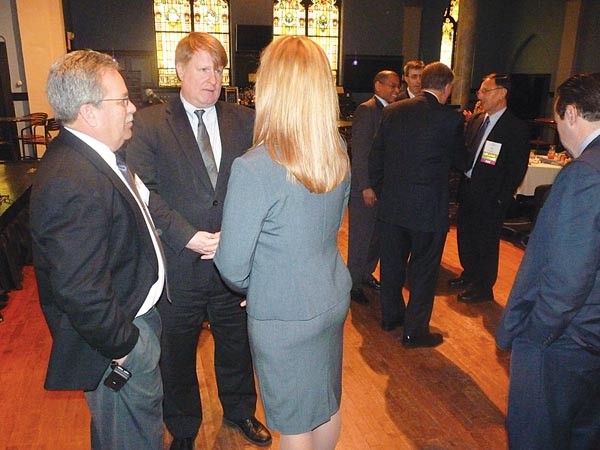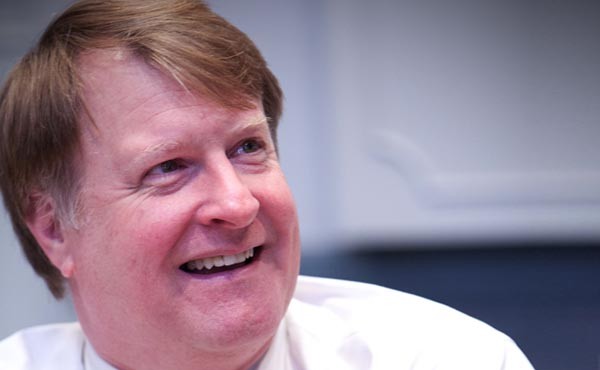Standing along Smallman Street in the Strip District, County Executive Rich Fitzgerald eyeballs the cars and trucks speeding by. And then, after a moment's hesitation, dashes across, through the rain — and nearly into the path of an oncoming car.
"We call that ‘the Fitzgerald'," says his spokeswoman, Amie Downes, with a laugh. "When you just go for it."
Fitzgerald has been county executive for just over a year, and his hard-charging style has become almost as well known as his accomplishments. On just his third day in office, he threw a monkey wrench into a court-ordered property reassessment, prompting speculation he might be found in contempt of court. He has since taken an active role in setting policy at nominally independent agencies like the Port Authority and the Board of Health. And he has slugged it out with high-profile politicians, ranging from legendary former coroner Cyril Wecht to Pittsburgh Mayor Luke Ravenstahl.
"Since he's become county executive — and this isn't unique to me — there are many folks that have shared similar stories about the fact that it's Rich's way or the highway," says Ravenstahl. "If you disagree with Rich, he tends to make it personal and it becomes, in many cases, vindictive."
"He's a lovable bull in a china shop," acknowledges U.S Rep. Mike Doyle (D-Forest Hills), who's known Fitzgerald most of his political career. "Sometimes he just charges ahead with his heart."
But as Doyle points out, whatever else can be said about Fitzgerald, "This is a guy who gets things done."
Fitzgerald, whose day job had previously been heading the engineering firm Aquenef, came to the county executive post by way of Allegheny County Council, where he served for 11 years. County councilors have little public visibility, and when Fitzgerald announced his 2011 executive bid, it appeared he faced an uphill climb against Mark Patrick Flaherty, then the county controller. But Fitzgerald beat out Flaherty then trounced Republican D. Raja in November. And he quickly set about making a name for himself.
Fitzgerald took the oath of office on Jan. 3, 2012. On Jan. 5, as he promised on the campaign trail, he stood up to Common Pleas Judge Stanton Wettick, refusing to send out newly assessed property values that Wettick had ordered in a county-wide reassessment. Wettick threatened to hold Fitzgerald's underlings in contempt of court if they didn't comply.
Fitzgerald didn't waver. "If the Court believes that removing the elected officials from this process ... will result in my stopping this fight — the court can think again," he said in a statement. Ultimately, the new values did go out, though Wettick delayed their use by a year.
"Rich is fearless when he gets behind an issue," says Doyle. "He's the guy you want in a foxhole with you." And indeed, Fitzgerald hasn't wasted time fulfilling some campaign pledges.
The county's Human Relations Commission, for example, had spent two years pressuring Fitzgerald's predecessor, Dan Onorato, to approve domestic-partner benefits for county employees in same-sex relationships. Fitzgerald approved the benefits almost immediately; they've been available since April 1.
And in September, Fitzgerald made a bold move to thwart a state-mandated "Voter ID" requirement. Taking advantage of a provision that allowed voters to present IDs issued by nursing homes and colleges, Fitzgerald had the county-run Kane Regional Centers and CCAC begin offering IDs for residents — even if they lacked ties to the institutions. (A judge later suspended the voter-ID requirement.)
Fitzgerald's biggest win, though, may have been averting a massive 35-percent service cut at the Port Authority. State officials were refusing to provide additional funding without more money from the county and concessions from the transit agency's biggest union.
Rather than allow authority brass to handle talks on their own, Fitzgerald inserted himself directly into negotiations. Steve Palonis, president and business agent of Amalgamated Transit Union Local 85, said that without Fitzgerald's involvement, a contract would not have been reached in time to avert cuts.
"Rich was instrumental in getting in touch with us and [the Port Authority]" early, Palonis says. "He kept both sides to the fire."
"We had to take over those negotiations or we would have had cuts. ... I'd do it again in a heartbeat," Fitzgerald says.
Boards and authorities, in his view, simply lend advice and expertise. "Where directors and folks are running things in an efficient manner, I'll be hands-off as much as I can be," Fitzgerald says. Still, he says, "None of the boards are independent," and as the elected official, "I'm the one who has the interest of the people."
But Fitzgerald's hard-charging style has also opened him up to complaints that it's not the people's interests he's looking out for. Especially on environmental issues.
Earlier this month, the Allegheny County Board of Health approved new guidelines to regulate toxic air emissions by county polluters. But the rule was weaker than a measure the board passed last year: Instead of measuring emissions at a facility's property line, officials would sample air quality at the nearest habitable structure.
"They were supposed to be that way originally ... as a compromise," says Fitzgerald, who says he met with board members before they voted to loosen the requirements, as well as industry, business and environmental representatives. "Maybe there was a little miscommunication between the environmental community and industry" as to what the regulations should be.
But questions have been raised about how independent the board is. Early last year, board members voted to remove Dr. Bruce Dixon as county health director, a position he held for two decades. In an ensuing lawsuit, Dixon's attorney has argued that Fitzgerald compelled board members to sign undated resignation letters. Such letters could allow Fitzgerald to remove a board member whenever he wished.
Environmentalists are also concerned by the way Fitzgerald has gone about a proposal to allow gas-drilling on county-owned land near the Pittsburgh International Airport. "The people were not involved with this in any meaningful way nor were their opinions sought," says former city councilor and environmental activist Doug Shields. "There was never a larger discussion forwarded to the community for our consideration. That's just wrong."
Fitzgerald's hard-driving approach toward independent authorities hasn't just raised the eyebrows of environmentalists. Such boards "technically are all independent," says Jim Roddey, Allegheny County's first county executive. And although "that independence is limited by the fact that the county executive appoints board members," Roddey says, "Rich really wants them to function more like a department that reports directly to him rather than as an independent entity."
Roddey, who lost a re-election bid amid outrage over an earlier battle over countywide property reassessment, also faults Fitzgerald's handling of the issue.
"I guess I'm old-fashioned, but when I raise my hand to uphold the law, I think I ought to obey the law and obey court orders," says Roddey. "[Fitzgerald's] defiance had nothing to do with the right or wrong of the law. It was about currying the favor of the voters."
Still, Roddey credits Fitzgerald with an "outstanding" work ethic and says, "He tries to be involved in all aspects of the community. I think in that regard he's doing a very good job."

Not every politician is so forgiving.
Fitzgerald was elected at the same time as County Controller Chelsa Wagner, but the two began feuding almost before they were sworn in. Wagner said the disagreements began in the waning weeks of 2011, when county council passed a 1-mill tax increase — just before Fitzgerald took office as county executive.
Wagner says Fitzgerald "demanded" that she issue a press release supporting the hike. "I said, ‘I think I'll decide what my press releases are, but I would be happy to call council members and tell them I support them,'" Wagner recalls.
Fitzgerald says Wagner went back on an agreement she made on the campaign trail. "She had indicated she was going to support it ... and then she reneged," he says. The two have since tangled over issues like the handling of property-tax assessments and whether the county's Bureau of Weights and Measures — whose inspection stickers have previously advertised the name of the county controller — should remain in Wagner's office.
Fitzgerald has also squabbled with Cyril Wecht, an outspoken figure who wanted to return to the county medical examiner's office after a federal case against him collapsed. Fitzgerald discussed that possibility, but among other things the two disagreed over Fitzgerald's demand that Wecht clear media requests through the executive's office.
Fitzgerald "totally lied" about his willingness to hire him, Wecht now says. Despite the fact that Wecht had received dozens of letters of support from local leaders and forensics experts, "It became obvious, as obvious as the lack of hair on the top of my head: It didn't make a goddamn difference if he heard from God — he had his mind made up. He had been bullshitting me all along."
Fitzgerald says he wanted his administration to have a common message: "You cannot have individuals who work for the administration not supporting what the administration does."
But perhaps Fitzgerald's most contentious foe is Ravenstahl. Both men acknowledge that they don't have a working relationship ... and that's about all they agree on.
Ravenstahl says things soured when Fitzgerald "took a cheap shot" at him after his election victory, telling the Pittsburgh Post-Gazette he'd work with the mayor even though Ravenstahl "doesn't always show up for things and he doesn't always work every day."
At the time, the two pledged to get beyond such resentments, and to meet twice a month. Those meetings are no longer being held: Fitzgerald says Ravenstahl attended only two; Ravenstahl disputes that claim but says the meetings ended because "Rich was more interested in getting information from me about my [mayoral opponent Bill Peduto] than helping the region. He's more focused on politics than on policy."
Fitzgerald disputes such claims, though he doesn't back down from his original criticism. "I have a pretty good track record of getting along with a whole lot of folks," he says. Ravenstahl, he says, is "one mayor out of 130" in the county. "I get along with 129 other mayors. ... It's hard to work with a mayor who doesn't show up."
And as Fitzgerald's endorsement of Peduto suggests, he's clearly hoping to replace that 130th mayor.
Peduto was an early backer of Fitzgerald's campaign, but the two haven't always been allies. Fitzgerald and Peduto had a falling-out during the 1996 congressional campaign of Peduto's former boss, then-councilor Dan Cohen. Fitzgerald abandoned Cohen over attacks that he later called a "slime campaign" against incumbent Democrat Bill Coyne.
Of Fitzgerald's bluntness, Peduto says today, "It's refreshing in politics because so many people can be sly." Nor is Fitzgerald's support just quid pro quo for Peduto's own backing, he says. Peduto says that during the county-executive campaign, when he asked Fitzgerald if he would pledge his future support, Fitzgerald answered, "I can't make that deal.'"
But last fall Fitzgerald moved in a hurry, announcing his support of Peduto before Peduto even entered the race, and before a third Democrat, City Controller Michael Lamb, declared his candidacy. Those who know him say that's vintage Fitzgerald — getting ahead of things.
Fitzgerald jumped "before the field was flushed out and [without] consulting other elected officials," says county councilor and longtime friend Barbara Daly Danko. "I think Rich likes loyalty."
And he's in a position to expect it in return.
"I think some people are reluctant to disagree with him," Danko adds. "But I think that's true with any executive."















